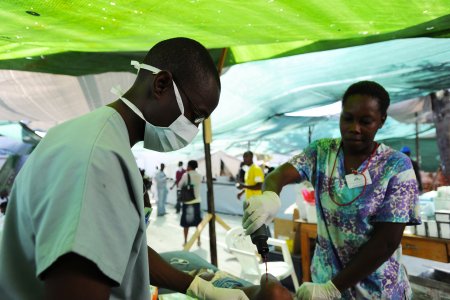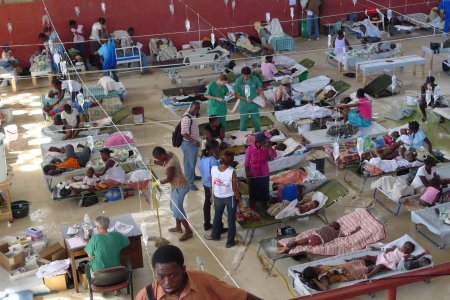
The origins of the 2010 Haiti cholera outbreak
Elba Rahmouni, Jean-Hervé Bradol & Emmanuel Baron

Since April 2018, Elba has been in charge of dissemination at CRASH. Elba holds a Master's degree in History of Classical Philosophy and a Master's degree in editorial consulting and digital knowledge management. During her studies, she worked on moral philosophy issues and was particularly interested in the practical necessity and the moral, legal and political prohibition of lying in Kant's philosophy.

Medical doctor, specialized in tropical medicine, emergency medicine and epidemiology. In 1989 he went on mission with Médecins sans Frontières for the first time, and undertook long-term missions in Uganda, Somalia and Thailand. He returned to the Paris headquarters in 1994 as a programs director. Between 1996 and 1998, he served as the director of communications, and later as director of operations until May 2000 when he was elected president of the French section of Médecins sans Frontières. He was re-elected in May 2003 and in May 2006. From 2000 to 2008, he was a member of the International Council of MSF and a member of the Board of MSF USA. He is the co-editor of "Medical innovations in humanitarian situations" (MSF, 2009) and Humanitarian Aid, Genocide and Mass Killings: Médecins Sans Frontiéres, The Rwandan Experience, 1982–97 (Manchester University Press, 2017).
Emmanuel Baron is a general practitioner who graduated from the University of Nantes. He spent several years working with Médecins Sans Frontières in the field and at headquarters. He was trained in epidemiology in London and joined Epicentre as General Director in 2008.
This article is an addition to Issue 25 of Humanitarian Alternatives "Food crisis: what role for humanitarian actors?", published in March 2024.
In 2010, just a few months after the earthquake that devastated Haiti and claimed so many victims, the country was hit by a cholera outbreak. It took the United Nations six years to half-heartedly acknowledge its responsibility for the epidemic. The three authors of this article review the chronology of this episode and draw lessons from it.
You can read the whole article online here.
 Eliza Currando
Op-ed
Eliza Currando
Op-ed
Faiblesses du dispositif anti-choléra à Haïti
11/23/2010 Rony BraumanL'épidémie de choléra qui sévit depuis près d'un mois à Haïti met en évidence la faiblesse du dispositif international de réponse à des épisodes aigus de ce type. Les violences dirigées contre les soldats de la Minustah, accusés par la rumeur publique d'être les vecteurs de cette maladie infectieuse, nous rappellent que les épidémies attisent les peurs.
 Julie Remy
Analysis
Julie Remy
Analysis
International Emergency Aid put to the Test in Haiti
03/16/2010 Jean-Hervé BradolEmotions generated by the brutal and murderous character of a natural disaster are not calmed by the feeling that the victims bear a certain responsibility for the origins of the drama.
 Aurelie Lachant
Interview
Aurelie Lachant
Interview
Haïti: l’ONU va-t-elle indemniser les victimes de l’épidémie de choléra ?
02/06/2012 Françoise Bouchet-Saulnier Fabrice WeissmanEntretien avec Françoise Bouchet-Saulnier, directrice juridique de MSF
Période
Newsletter
Subscribe to our newsletter to stay informed about our latest publications. Interested in a specific author or thematic? Subscribe to our email alerts.
